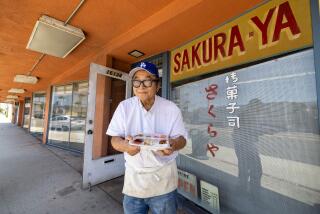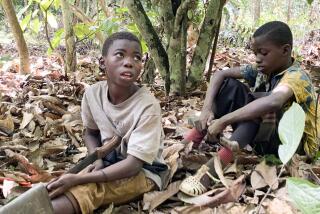Gang of Extortionists in Japan : Candy Poisoners Sour Valentine Spirit
- Share via
TOKYO — Like many Japanese women, Kazuko Kobayashi has doubts about St. Valentine’s Day this year.
“Usually I send chocolates to my favorite men on Feb. 14,” the 33-year-old sales clerk said. “Last year I sent them to my husband, my father, five colleagues and one client. But this year, well. . . .”
Her uncertainty springs from the activities of Japan’s “poison candy gang “ which have dramatically reduced the nation’s taste for confectionaries in the past four months.
The gang has sought to extort money from confectioners by threatening to plant poisoned samples of their products on store shelves unless a ransom is paid. Poison was actually found in chocolates made by the Morinaga Confectionary Co. Because it was so clearly labeled no one was harmed.
Nevertheless, the prospect of unlabeled poison turning up in chocolate has heavily damaged confectionary sales.
Japanese women, for whom St. Valentine’s Day is the time to profess their affection for men, are casting around for other kinds of gifts to demonstrate this.
Nevertheless, confectioners are still hoping sales will pick up on the day.
The director general of the Chocolate and Cocoa Assn. of Japan, Masahisa Uchino, said confectioners hope to sell around $150 million worth of goods, about 10% of annual sales, in the first half of February.
However, an executive at one major confectionary firm admitted that many customers now shy away from candy shelves for fear of being suspected as part of the poison conspiracy.
Many chocolate makers have reduced production since October last year when the gang’s threats began to take effect among consumers.
Confectionary sales in October to December fell 10% to 15% from levels of the previous year, according to industry sources.
Morinaga has been the best known of the victims. Many large supermarkets have stopped stocking Morinaga products.
A Morinaga spokesman said his company cut confectionary production to only 10% of the previous year’s from late October to November. But sales improved in December thanks to help by customers.
To make up losses, the company has sent its employees and their families out to make direct sales of products called “1,000-yen packets” comprising Morinaga sweets worth $4. In October to December, 3.5 million packets were sold under direct sales and another one million packets are expected to be sold in January, he said.
“We had no idea that this extortionists case could have lasted so long,” the spokesman said. The company vowed to resist demands for ransom even at the cost of heavy business losses.
The gang calls itself “The Man with 21 Faces” after a crime novel of the 1930s. Worried about the gang’s impact, Prime Minister Yasuhiro Nakasone ordered government officials to try to help Morinaga any way they could.
The Food and Marketing Bureau of the Agriculture Ministry has set up a special team to cope with the case.
“The poison candy case has threatened the credibility of Japanese foods and also has damaged children’s pleasure,” said Keiichi Nakamura, a member of the special team which has staged sales promotions of Morinaga sweets for government officials.
He said he has received a number of requests from schoolteachers on whether to advise children and their parents not to eat sweets.
More to Read
Sign up for Essential California
The most important California stories and recommendations in your inbox every morning.
You may occasionally receive promotional content from the Los Angeles Times.













